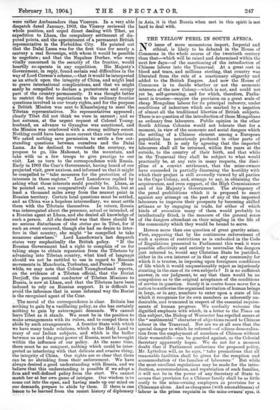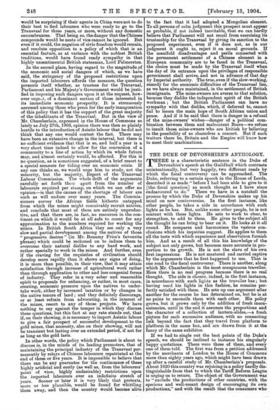THE YELLOW PERIL IN SOUTH AFRICA.
N0 issue of more momentous import, Imperial and ethical, is likely to be debated in the House of Commons in the whole course of the twentieth century than that—which will be raised and determined within the next few days—of the sanctioning of the introduction of Chinese labour into the Transvaal. At a great cost in blood and tears, and millions sterling, that country was liberated from the rule of a reactionary oligarchy and added to the British Empire. And now the House of Commons is to decide whether or not the economic interests of the new Colony—which is not, and could not yet be, self-governing, and for which, therefore, Parlia- ment is trustee—require the provision on a great scale of cheap Mongolian labour for its principal industry, under conditions of indenture which are marked by a negation of almost all the traditional liberties of British subjects. There is no question of the introduction of these Mongolians as ordinary free labourers. Public opinion in the other South African Colonies would not tolerate that for a moment, in view of the economic and social dangers which the settling of a Chinese element among a European population has notoriously produced in other parts of the. world. It is only by agreeing that the imported labourers shall all be returned, within five years at the outside, to the country of their birth, and that while in the Transvaal they shall be subject to what would practically be, at any rate in many respects, the disci- pline of a convict settlement, that the mine-owners have succeeded in partially disarming the hostility with which their project is still avowedly viewed by all parties in the Cape Colony, and, strange to say, in obtaining the acquiescence, and even support, of the High Commissioner and of his Majesty's Government. The stringency of the penal prohibitions which it is proposed to enact against any attempt on the part of any of the imported labourers to improve their prospects by becoming skilled artisans or by engaging in trade, for either of which kinds of avocation many of them would probably be intellectually fitted, is the measure of the general sense of the dangers attendant on their mingling in the life of the community which they would be bound to serve.
Hereon more than one question of great gravity arises. First, supposing that by the continuous enforcement of such a system of restrictions as is embodied in the Code of Regulations presented to Parliament this week it were possible effectively and entirely to neutralise the dangers just referred to, would any Christian State be justified, either in its own interest or in that of any community for which it is trustee, in imposing upon foreigners conditions of life which it would unquestionably reject as injuriously stunting in the case of its own subjects P It is no sufficient answer, in our judgment, to say that there would be no compulsion as to the original acceptance of the conditions of service in question. Surely it is contra bows mores for a nation to authorise the organised invitation of human beings in large, or in any, numbers to enter upon a state of life which it recognises for its own members as inherently un- desirable, and truncated in respect of the essential require- ments of human progress. We cordially welcome the dignified emphasis with which, in a letter to the Times on this subject, the Bishop of Worcester has repelled sneers at the" sentimental" character of objections raised to Chinese labour in the Transvaal. Nor are we at all sure that the special danger to which he referred—of odious demoralisa- tion from the employment of numbers of Chinese without their womenfolk—can be guarded against, as the Colonial Secretary apparently hopes. We do not for a moment doubt that if Parliament authorises the proposed policy, Mr. Lyttelton will, as he says, "take precautions that all reasonable facilities shall be given for the reception and accommodation of the families of labourers." But while the most excellent regulations may be made for the intro- duction, accommodation, and repatriation of such families, it will not be in the power of any Secretary of State to secure that provision for a Chinese family shall be as little costly to the mine-owning employers as provision for a Chinaman alone. And as cheapness (with amenableness) of labour is the prime requisite in the mine-owners' eyes, it would be surprising if their agents in China were not to do their best to find labourers who were ready to go to the Transvaal for three years, or more, without any domestic encumbrances. That being so, the danger that the Chinese compounds would be nests of vice cannot be ignored. But even if it could, the negation of civic freedom would remain, and resolute opposition to a policy of which that is an essential feature, as at variance with the noblest British traditions, would have found ready sympathy in that highly unsentimental British statesman, Lord Palmerston.
In the second place, having regard to the magnitude of the economic and social dangers of which, as we have said, the stringency of the proposed restrictions upon the imported labourers affords the measure, the question presents itself whether, as trustees for the Transvaal, Parliament and his Majesty's Government would be justi- fied in imposing such dangers upon it at the request, how- ever urge.it, of a dominant section of those interested in its immediate economic prosperity. It is strenuously assumed among those who press for the early inauguration of this policy that it has the support of the great majority of the inhabitants of the Transvaal. But in the view of Mr. Chamberlain, expressed in the House of Commons so lately as July 27th, 1903, opinion there was then so plainly hostile to the introduction of Asiatic labour that he did not think that any one would contest the fact. There may have been an extensive change in the interval, but there is no sufficient evidence that that is so, and half a year is a very short time indeed to allow for the conversion of a community to a line of action by which its whole future may, and almost certainly would, be affected. For this his no question, as is sometimes suggested, of a brief resort to a special measure for tiding over an economic crisis. If any one thinks so, we would urge him to study, not the minority, but the majority, Report of the Transvaal Labour Commission. The whole drift of the arguments carefully set forth there apart from the number of labourers required per stamp, on which we can offer no opinion—is that the causes of the shortage of labour are such as will endure over many years. The Commis- sioners survey the African fields• hitherto untapped from which the mines might conceivably recruit natives, and conclude that most of them are entirely unproduc- tive, and that there are, in fact, no resources in the con- tinent on which it would be at all safe to count for any approximation to the numbers required for working the mines. In British South Africa they see only a very slow and partial development among the natives of those "progressive desires" (in Mr. Bonamy Price's favourite phrase) which could be reckoned on to induce them to overcome their natural dislike to any hard work, and rather specially to work in the mines. And further, even if the craving for the requisites of civilisation should develop more rapidly than it shows any signs of doing, it is more than possible, in their view, that it may attain satisfaction through increase of agricultural work rather than through application to other and less congenial forms of industry. They refer in a very sober and reasonable spirit to proposals for enhancing, or rather, in most cases, creating, economic pressure upon the natives to under- take work, either by increased taxation or by changes in the native tenure of land ; and they definitely discourage, or at least refrain from advocating, in the interest of the mines, resort to any of those projects. We have nothing to say against the temper in which they discuss these questions, but this fact at any rate stands out, that if, on their showing, it is necessary to import Asiatic labour to give a fair prospect of successful development to the gold mines, that necessity, also on their showing, will not be transient but lasting over an extended period, if not for as long as the gold lasts.
In other words, the policy which Parliament is about to discuss is, in the minds of its leading promoters, that of maintaining the principal industry of the Transvaal per- manently by relays of Chinese labourers repatriated at the end of three or five years. It is impossible to believe that there can be any guarantee for the continuance of these highly artificial and costly (as well as, from the labourers' point of view, highly undesirable) restrictions upon the imported labourers over an indefinite stretch of years. Sooner or later it is very likely that pretexts, more or less plausible, would be found for whittling them away, and then the country would become alive to the fact that it had adopted a Mongolian element. To all persons of calm judgment this prospect must appear so probable, if not indeed inevitable, that we can hardly believe that Parliament will not recoil from exercising its trusteeship for the Transvaal by giving its sanction to the proposed experiment, even if it does not, as in our judgment it ought to, reject it on moral grounds. If the manifold disadvantages and perils connected with the permanent settlement of a Chinese element in a European community are to be faced in the Transvaal, the choice must be made by the Transvaal itself when the day of its entrance upon the privileges of responsible government shall arrive, and not in advance of that day by Imperial authority. The true, even if the slow-working, remedy for the economic difficulties of the Transvaal lies, as we have always maintained, in the settlement of British immigrants. The mine-owners are averse to that solution, because they dislike the independent spirit of the British workman ; but the British Parliament can have no sympathy with that dislike, which, if deferred to, cannot fail to lessen the main hope of South African union and peace. And if it be said that there is danger in a refusal of the mine-owners' wishes—danger of a political com- bination between them and malcontent Boers—we refuse to insult those mine-owners who are British by believing in the possibility of so shameless a concert. But if such traitors there be, Britain and the Empire will know how to meet their machinations.







































 Previous page
Previous page